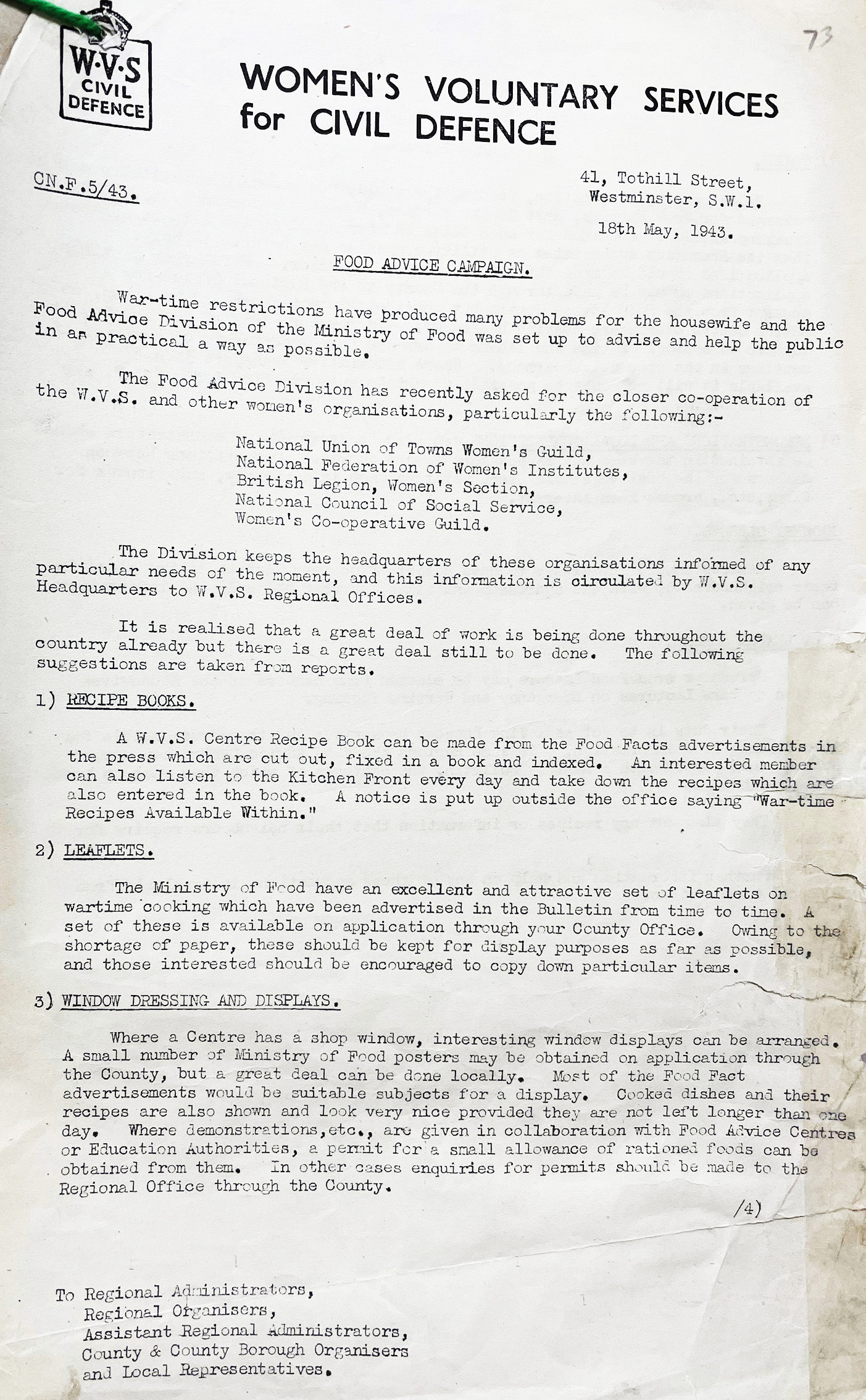
Women’s Voluntary Services for Civil Defence (WVS) was initially formed to help recruit women into civil defence to help civilians during and after air raids and with the evacuation and billeting of children [see Catalogue ref: INF 13/171.] By 1943, the organisation had over 1 million volunteers. These women played a vital role in wartime life. This source shows their importance in the organisation of the government’s wartime food campaign and the support they provided on the Home front, 18 May 1943, Catalogue ref: MAF 102/11
The WVS ran field kitchens and rest centres for people made homeless by bombing; provided canteens at railway stations for soldiers and sailors; escorted children being evacuated; running clothing centres for those who had lost all their possessions; operating car pools once petrol rationing was introduced; helping people salvage their personal belongings from bombed-out houses; and doing domestic work in hospitals and clinics.
The women who joined the WVS were those with domestic responsibilities, such as looking after children or relatives, who could not join the armed forces or the Land Army, or work in a factory. Only the organisers received any payment, everybody else gave their services free. The women of the WVS even had to buy their own uniform.
- What does this source show about importance of women in the organisation of the government’s wartime food campaign?
- What general support did the WVS provide on the Home front?
Transcript
Women’s Voluntary Services for Civil Defence
41, Tothill Street,
Westminster, S.W. 1.
18th May, 1943.
FOOD ADVICE CAMPAIGN
War-time restrictions have produced many problems for the housewife and the Food Advice Division of the Ministry of Food was set up to advise and help the public in as practical a way as possible.
The Food Advice Division has recently asked for the closer co-operation of the W.V.S. and other women’s organisations, particularly the following:-
National Union of Towns Women’s Guild,
National Federation of Women’s Institutes,
British Legion, Women’s Section,
National Council of Social Service,
Women’s Co-operative Guild.
The Division keeps the headquarters of these organisations informed of any particular needs of the moment, and this information is circulated by W.V.S. Headquarters to W.V.S. Regional Offices.
It is realised that a great deal of work is being done throughout the country already but there is a great deal still to be done. The following suggestions are taken from reports.
1) RECIPE BOOKS.
A W.V.S. Centre Recipe Book can be made from the Food Facts advertisements in the press which are cut out, fixed in a book and indexed. An interested member can also listen to the Kitchen Front every day and take down the recipes which are also entered in the book. A notice is put up outside the office saying “War-time Recipes Available Within.”
2) LEAFLETS.
The Ministry of Food have an excellent and attractive set of leaflets on wartime cooking which have been advertised in the Bulletin from time to time. A set of these is available on application through your County Office. Owing to the shortage of paper, these should be kept for display purposes as far as possible, and those interested should be encouraged to copy down particular items.
3) WINDOW DRESSING AND DISPLAYS.
Where a Centre has a shop window, interesting window displays can be arranged. A small number of Ministry of Food posters may be obtained on application through the County, but a great deal can be done locally. Most of the Food Fact advertisements would be suitable subjects for a display. Cooked dishes and their recipes are also shown and look very nice provided they are not left longer than one day. Where demonstrations, etc., are given in collaboration with Food Advice Centres or Education Authorities, a permit for a small allowance of rationed foods can be obtained from them. In other cases enquiries for permits should be made to the Regional Office through the County.
To Regional Administrators,
Regional Organisers,
Assistant Regional Administrators,
County and County Borough Organisers
and Local Representatives.
